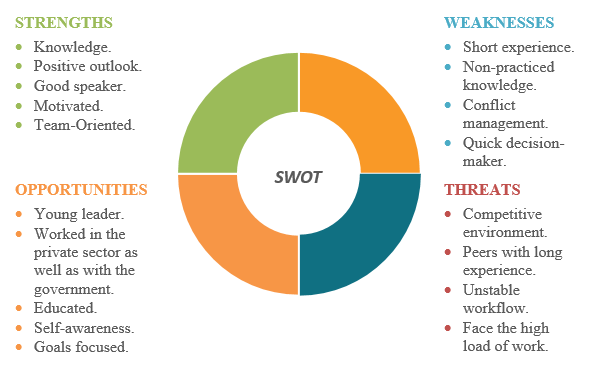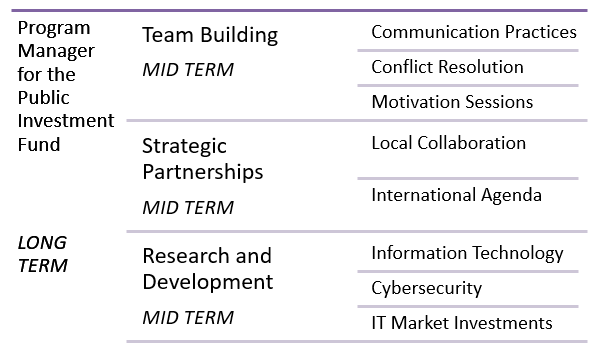As for my strengths, a positive outlook plays a critical part in my leadership style. Based on my ESCI ASSESSMENT score, I keep coping with the difficult lifestyle of work and keep sourcing another, positive, half of the image considering the heavy load of work. As a self-motivated person, I strive to affect positively and appreciate the value of a constant personal and professional improvement.
I believe in the Lead by Example strategy, for that, I express my views, believes and vision and discusses how it suits our corporate objectives and our self-progress. I acquire information from its comparison, for instance, my pursuit of higher education with the Executive Master of Business Administration. In addition, I am team-oriented, as I believe that a leader will succeed with his advocates, that it is important to sharpen my team’s skills by shared knowledge and test their decisions as well as communication skills and engagement.
Speaking of weaknesses, I do not have the expertise yet and still need to learn and participate in knowledge-gaining activities more. Often, I miss coping with disputes in a proper way and making a fast decision that somehow does not work well for the long term. I do not manage my conflicts well as I tend to deal with, whether I win or lose, which has hampered my growth and prevented me from adopting new ideas (see Fig. 1). It is an important drawback because it shows that I have to practice my communication more and gain more insight into how to “read” people, and become more empathetic.
As a young woman in Saudi Arabia within the Renaissance, the biggest opportunity that I currently see for myself is the process of empowering the role of women in business. I have the opportunity to speed up my level of progress with my career path. Moreover, I had worked in the private sector, and currently, I am working for the government, which is a reference to me striving to achieve the greatest objectives. Irrespective of what goes on around me, I remain self-aware in order to make decisions quickly and consider every little bit of information related to the case. I consider my attentiveness to be another opportunity for my career and personal development because it helps me build closer relationships with the followers and affect their behaviors in a positive way.

Ultimately, I face threats from my peers who have more experience and knowledge in the field. An essential challenge for me is to cope with the increasing competitiveness within the workplace environment because it destabilizes me and limits my decision-making. I could have trouble adjusting to an unstable workflow that would force me to leave my comfort zone and do things I might have never done before. Accordingly, I am seriously worried about the size of the workload that might hit me as soon as I would become a full-time leader for an organization. I cannot do anything about the lack of experience, as it should come naturally, but more experienced leaders would always remain a threat for me because I stress a lot about making mistakes and not being able to correct them afterward.
Direction
My intended direction is to become a project manager for the Public Investment Fund in order to become a positive example for other leaders from the field and help them achieve their own objectives. I believe that individual success is not the right metric to reckon with, so I would like to pursue a career that would be meaningful for more people rather than me alone. Even though I do not actually resort to the stereotypical thinking about gender roles in business, I feel like obtaining a leadership position would help me empower females at the end of the day.
My eventual pathway would touch upon the notion of leadership to signify the importance of interpersonal relationships and prove that there may be numerous ways to achieve greatness and share knowledge with the followers. In a sense, the concept of leadership that I am looking for extends beyond monetary incomes and relates to how a company’s human resources behave in certain situations and what they do to gain others’ respect.
Purpose
I feel like the best way to explain why I am so moved by the idea of becoming a leader in the peculiar worldview that does not let me stay idle for a long time. My passion is to improve the world around me and make it a better place for others, so I think that leading an organization along the path to greatness is something that motivates me the most. Not only would that be a hint at personal and professional growth, but it would also serve as an opportunity for me to overcome the delimitations of my comfort zone. I am aware of my weaknesses and external threats, so another side of my passion is to become a flawless professional and turn into a role model for those around me. Accordingly, the purpose would be to go beyond organizational achievements and set the bar higher for my family members and friends. This would make me feel much better, as I would know that my leadership efforts were not in vain.
Roadmap
For my leadership roadmap, I chose the position of a project manager for the Public Investment Fund as my intended long-term goal. I am looking to build a team that would be ready to perform at a high level consistently to display effective rivalry. The lack of stronger initiatives is what makes me believe that a unique leadership approach to this position would be an eventual competitive advantage for the organization.

Senior project management is my ultimate mid-term goal. In order to achieve it, I chose teambuilding, strategic partnerships, and research and development initiatives as the supporting tools. The process of team building should be supported by three short-term goals (communication practice training, conflict resolution, and motivation sessions) (Ivanov et al. 364). The concept of strategic partnerships includes two short-term elements (local collaboration prospects and international agenda elaboration) (Kaur et al. 47). Ultimately, the research and development goals presuppose a multifaceted approach to training employees (information technology, cybersecurity, and IT market investments) (Hughes et al. 338).
The short-term objective for me would be to shift to the projects field and learn more about the required knowledge and practical experience. The mid-term goals are to be met by the end of the third year since implementation, as my intention would be to develop many strategic partnerships and gain some reasonable experience by the end of that period. After four and a half years, I would expect my team to realize the key ways of achieving success and represent a strong brand that would be in line with the organizational identity and initial professional development goals.
Throughout the process of achieving short-, mid-, and long-term goals, I would like to establish a close relationship with the research and development unit in order to accomplish goals in the most effective ways possible. The team might not have all the required resources along the way, which also sends me back to communicating with every follower to gain access to unique feedback, similarly to how Richard Branson did for his Virgin Atlantic brand (Fickry et al. 21). My current vision does not require an exceptional amount of resources, but I think that over time, the process of growth would force the team to invest more in technology and professional development.
Known/Unknown
To be specific, I do not have enough field-related knowledge at the moment to become a strong leader and help the team achieve success. I feel like the most important skill that I have to master is conflict management because my interactions with other people tend to be somewhat inconsistent. This could eventually improve my decision-making approaches and contribute to a healthier workplace where employees are collaborating instead of rivaling. In order to meet my leadership goals, I would also have to gain more insight into motivation and persuasion techniques because, occasionally, I do not feel like I am authoritative enough to delegate tasks and lead people.
There is also a need for stronger computer skills to meet my goals because information technology serves as the basis for many operations and strategies. Organizational success ultimately depends on the presence of such instruments because they reduce the occurrence of human errors and create room for forecasting capabilities. I do not have enough knowledge regarding technological innovation, so it would be crucial to collaborate with the research and development unit and explore the field to see if there are any relevant instruments to be utilized.
Speaking of what I still have to find out, I would like to mention communication strategies, as I am a young specialist with limited experience. There is not enough professional knowledge that I have acquired to lead people by example and foresee potential challenges. My greatest intention is to learn more about how to become the best leader for your followers and establish a positive workplace environment. It would be a benefit for me to learn how to be confident and prevent conflicts instead of letting them happen.
Bottom Line
At the end of this leadership assessment project, I would like to state that I realized most of my weaknesses and highlighted some of the blind spots that I could not have been able to identify in the past. My plan is to communicate with followers more in order to gain valuable feedback and see how different strategies work with various employees. A program manager position can be achieved under the condition where my confidence shines just enough to show others that I know what I am doing. Followers should be certain of the fact that I am leading them toward success, as otherwise, none of my activities would show even a trace of effectiveness. I still have a lot to learn about conflict resolution and rivalry, as it fazes me and averts me from making reasonable decisions under pressure.
Works Cited
Fickry, Ahmad, et al. “Leadership and Organizational Success: A Study of AirAsia.” Advances in Global Economics and Business Journal, vol. 1, no. 1, 2020, pp. 12-25.
Hughes, Ashley M., et al. “A Checklist for Facilitating Training Transfer in Organizations.” International Journal of Training and Development, vol. 22, no. 4, 2018, pp. 334-345.
Ivanov, Radmir V., et al. “Coaching as a Conflict Resolution Technique in Organizations.” Amazonia Investiga, vol. 7, no. 14, 2018, pp. 362-367.
Kaur, Sarabjot, et al. “Organizational Ambidexterity through Global Strategic Partnerships: A Cognitive Computing Perspective.” Technological Forecasting and Social Change, vol. 145, 2019, pp. 43-54.